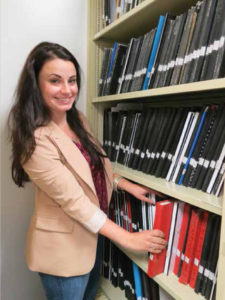The AERA Archives are now officially registered with the Library of Congress, recognized as archives and special collections libraries. As part of the registration process, our Boston and Giza Archives were given special MARC Organization Codes, which are used to represent names of libraries and other kinds of organizations that need to be identified in the bibliographic environment.
These codes are an essential reference tool for systems reporting library holdings, and for those who may be organizing cooperative projects on a regional, national, or international scale. With this recognition, the AERA Archives can be compatible with other library catalogs, making our material accessible when it is open to the public.
Under the direction of AERA Head Archivist Megan Lallier, MLS, our Archives are responsible for ensuring institutional accountability, and for enhancing access to the resources in its care by appraising, acquiring, organizing, describing, making available, and preserving the records of the organization and related documentary materials.
The Archives’ mission is to document the goals and activities of AERA and its contribution of insight and understanding of cultural evolution in Egypt, serving as a primary source of evidence for over 30 years of archaeological investigation in Egypt and as a resource of international significance. The Boston Archive contains originals of over 7,000 drawings including the only scale maps of the Sphinx, approximately 175 linear feet of excavation and specialist data, over 350 notebooks, as well as historic stereoviews, postcards, and photographs. Assistant Archivist Rana Morgan oversees the Giza Archive, which serves as a clearing house for records directly from the field, containing duplicates of all originals to provide access to current and former AERA team members working in Egypt.
Looking ahead, the Archives will be a central component to the intellectual life of AERA, upholding and exemplifying quality, professional access and service to all users while preserving and celebrating its history. Our collections and services will facilitate growth, research, and understanding of AERA and its projects, and will document and highlight its contribution of insight and understanding of cultural evolution in Egypt.

